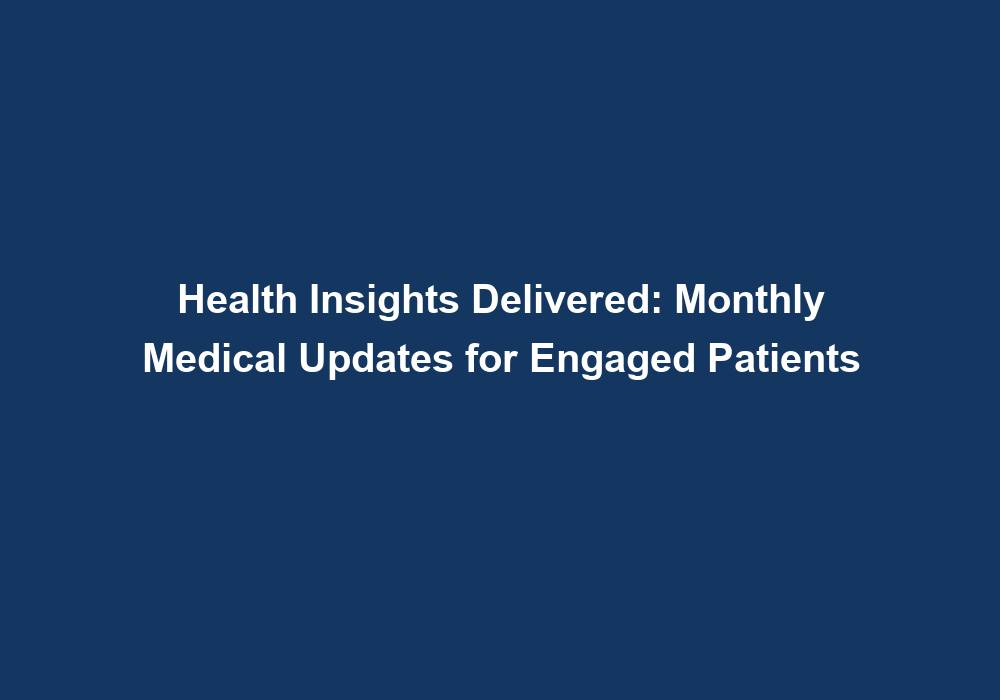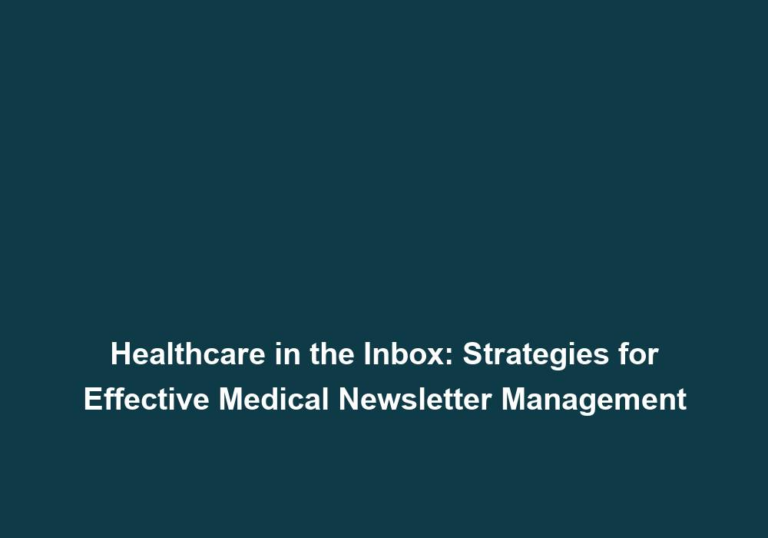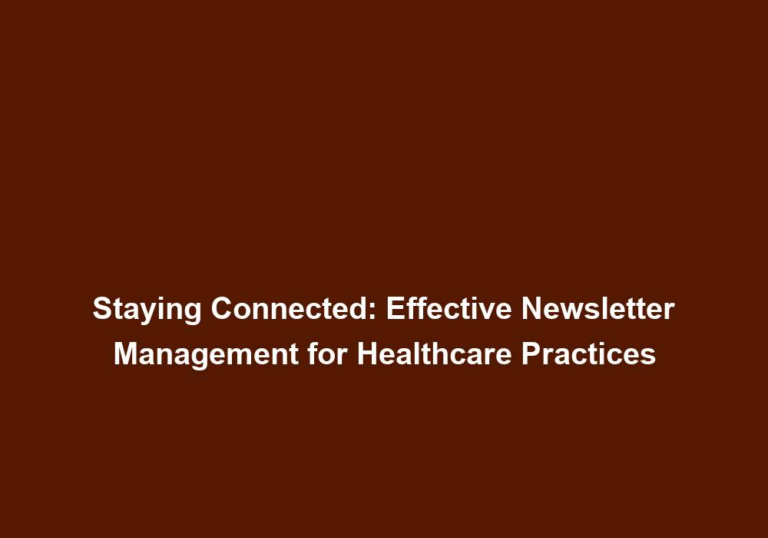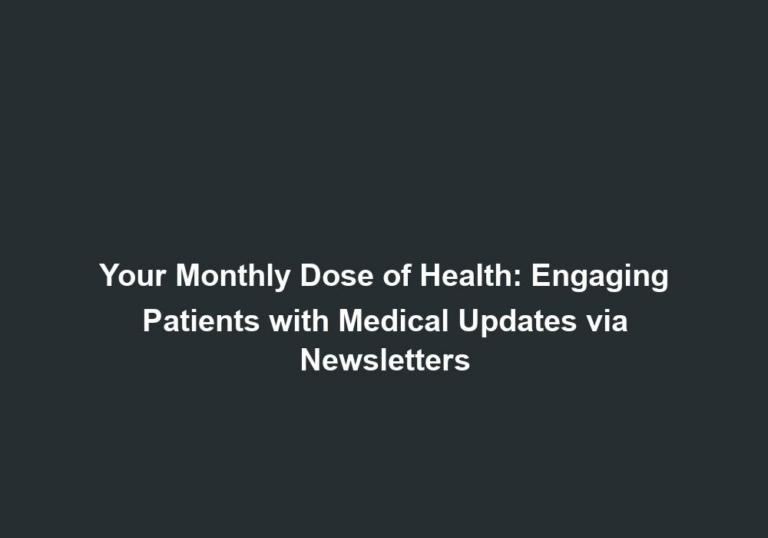Health Insights Delivered: Monthly Medical Updates for Engaged Patients
In the fast-paced world of healthcare, staying informed about the latest medical updates is crucial for both patients and healthcare professionals. With advancements in technology and research, it’s essential to have a reliable source that provides monthly updates on health insights. This article explores the importance of monthly medical updates for engaged patients and how it can contribute to their overall well-being.
The Need for Monthly Medical Updates
- Keeping up with the latest research: The healthcare industry is constantly evolving, with new studies and breakthroughs being published regularly. Engaged patients understand the importance of staying informed to make informed decisions about their health. Monthly medical updates provide them with the latest research and findings.
Staying up-to-date with the latest research is crucial for engaged patients. The healthcare industry is constantly evolving, with new studies and breakthroughs being published regularly. By receiving monthly medical updates, patients can stay informed about the latest research in their specific health conditions or areas of interest. This knowledge empowers them to make informed decisions and stay ahead of advancements in medical treatments and interventions. Moreover, being aware of the latest research helps patients understand the potential benefits and risks associated with various treatment options, enabling them to have more meaningful discussions with their healthcare providers.
In addition to the medical advancements, keeping up with the latest research can also help patients understand the changing landscape of healthcare policies, insurance coverage, and regulations. This knowledge can be especially valuable when it comes to navigating the complexities of the healthcare system and ensuring that patients receive the best possible care.
- Empowerment through knowledge: When patients have access to accurate and up-to-date medical information, they become empowered to take control of their health. Monthly medical updates equip them with valuable insights and allow them to have meaningful conversations with their healthcare providers.
Empowering patients through knowledge is essential for their overall well-being. Monthly medical updates provide patients with accurate and up-to-date medical information, enabling them to make informed decisions about their health. When patients are armed with knowledge, they can actively participate in their treatment plans, ask relevant questions, and explore alternative options. This empowerment promotes a sense of autonomy, allowing patients to make choices that align with their values and preferences.
Furthermore, having access to reliable medical information fosters a sense of confidence and trust in the healthcare system. Patients who are well-informed are more likely to trust their healthcare providers and engage in open and honest conversations. This enhances the patient-provider relationship and ensures that both parties are working towards the same goals.
- Prevention and early intervention: Regular medical updates often include information about preventive measures and early intervention strategies for various health conditions. By staying informed, patients can adopt proactive approaches to maintain their well-being and potentially prevent the onset of certain illnesses.
Prevention is always better than cure, and monthly medical updates provide patients with valuable information on preventive measures and early intervention strategies. These updates can include recommendations for lifestyle modifications, screening guidelines, and vaccinations to help patients reduce their risk of developing certain health conditions.
By staying informed about preventive measures, patients can take proactive steps towards maintaining their overall well-being. For example, if a monthly medical update highlights the importance of regular exercise and a healthy diet in preventing heart disease, patients can incorporate these recommendations into their daily lives. Similarly, if an update emphasizes the significance of early detection for certain cancers, patients can schedule regular screenings and seek medical attention at the first sign of any concerning symptoms.
- Improved decision-making: Informed patients are more likely to make better decisions regarding their health. Monthly medical updates provide them with a comprehensive understanding of different treatment options, potential side effects, and alternative therapies. This knowledge enables patients to actively participate in the decision-making process alongside their healthcare providers.
Making informed decisions about healthcare is essential for patients. Monthly medical updates offer patients a wealth of information about various treatment options, potential side effects, and alternative therapies. By having a comprehensive understanding of their health condition and the available options, patients can actively participate in the decision-making process alongside their healthcare providers.
For example, if a monthly medical update discusses different treatment options for a specific condition, patients can weigh the benefits and risks of each option and choose the one that aligns with their goals and preferences. Additionally, being aware of potential side effects allows patients to anticipate and manage any challenges that may arise during treatment. This knowledge also opens the door to exploring alternative therapies or complementary approaches that may complement conventional treatments.
- Enhanced patient-doctor communication: Clear and effective communication is key to successful healthcare outcomes. When patients are knowledgeable about the latest medical updates, they can engage in more meaningful discussions with their doctors. This facilitates a stronger doctor-patient relationship and ensures that both parties are on the same page when it comes to treatment plans and goals.
Effective communication between patients and healthcare providers is crucial for successful healthcare outcomes. Monthly medical updates enable patients to stay informed and up-to-date, which in turn enhances their ability to communicate effectively with their doctors. By being knowledgeable about the latest medical updates, patients can ask relevant questions, express their concerns, and actively engage in discussions about their treatment plans.
Moreover, when patients and doctors are on the same page, it fosters a stronger doctor-patient relationship built on trust and mutual understanding. Patients who feel heard and understood are more likely to adhere to their treatment plans, follow medical advice, and actively participate in their own care. This collaborative approach to healthcare ensures that patients receive the best possible care and achieve optimal health outcomes.
Components of Monthly Medical Updates
To provide engaged patients with the most comprehensive and valuable information, monthly medical updates should include the following components:
1. Research Highlights
Sharing recent research findings helps patients stay up-to-date with advancements in the medical field. This section can summarize significant studies, clinical trials, and their implications for different health conditions. It is important to present this information in an easily understandable manner, avoiding technical jargon and providing relevant context.
Research highlights are a crucial component of monthly medical updates as they keep patients informed about the latest advancements in the medical field. This section should summarize significant studies, clinical trials, and their implications for different health conditions. It is important to present this information in a clear and concise manner, avoiding technical jargon that may confuse or overwhelm the readers. Providing relevant context and explaining the potential impact of the research findings on patient care can help patients understand the significance of these advancements.
Additionally, including key takeaways and actionable insights from the research findings can empower patients to apply this knowledge to their own health journey. For example, if a study highlights the benefits of a specific exercise regimen in managing a certain chronic condition, patients can incorporate these exercises into their daily routine. By providing practical applications of the research, patients can actively engage with the information and take steps towards improving their health.
2. Health Tips and Recommendations
Offering practical health tips and recommendations is an essential part of monthly medical updates. This section can cover a variety of topics, such as exercise, nutrition, mental health, and preventative measures. Including actionable advice helps patients make positive changes in their lifestyle and adopt habits that promote overall well-being.
Health tips and recommendations are invaluable for engaged patients as they provide actionable guidance for maintaining and improving their health. This section can cover a wide range of topics, including exercise, nutrition, mental health, and preventative measures.
For instance, if the update focuses on exercise, it can provide specific recommendations for different age groups or fitness levels. It can outline the benefits of regular physical activity, suggest suitable exercises for various health conditions, and provide tips for incorporating exercise into a busy schedule. Including practical advice on how to overcome common barriers to exercise, such as lack of motivation or time constraints, can also be beneficial.
Similarly, the nutrition section can offer guidance on healthy eating habits, provide information about the benefits of certain foods, and suggest simple recipes or meal plans. By including practical tips and recommendations, patients can easily implement these changes into their daily lives and take steps towards improving their overall well-being.
3. Expert Interviews and Insights
Engaged patients appreciate hearing from experts in the healthcare industry. Conducting interviews with medical professionals and specialists can provide unique insights and perspectives on various health topics. These interviews can address frequently asked questions, debunk common health myths, and offer expert opinions on emerging trends and treatments.
Expert interviews and insights add depth and credibility to monthly medical updates. By featuring interviews with medical professionals and specialists, patients can gain unique insights and perspectives on various health topics. These interviews can provide expert opinions on emerging trends and treatments, address frequently asked questions, and debunk common health myths.
For example, an interview with a renowned cardiologist can shed light on the latest advancements in cardiovascular care, debunk common misconceptions about heart health, and offer practical advice for maintaining a healthy heart. Including expert insights helps patients understand complex medical concepts and make informed decisions about their health.
Moreover, these interviews can also provide an opportunity for healthcare providers to share their personal experiences and stories, creating a sense of connection and relatability with the readers. This humanizes the healthcare experience and fosters a sense of trust and rapport between patients and healthcare professionals.
4. Patient Success Stories
Including patient success stories can inspire and motivate readers. Sharing stories of individuals who have overcome health challenges or achieved remarkable improvements in their well-being can provide hope and encouragement. These stories serve as reminders that with the right knowledge and support, positive outcomes are possible.
Patient success stories are powerful tools for engagement and motivation. By featuring stories of individuals who have overcome health challenges or achieved significant improvements in their well-being, monthly medical updates can inspire readers and provide a sense of hope.
These stories can cover a wide range of health conditions and experiences. For instance, a success story may focus on a cancer survivor who defied the odds and regained their health, or a person who successfully managed a chronic condition through lifestyle changes. By highlighting these stories, patients can see real-life examples of what is achievable and may find the motivation to pursue their own health goals.
It is important to include details about the individual’s journey, including the challenges they faced, the strategies they employed, and the support they received. This enables readers to relate to the story and understand the steps taken to achieve success. Additionally, providing actionable takeaways from these stories can help patients apply the lessons learned to their own health journey.
5. Q&A Section
To promote engagement and address specific concerns, a Q&A section can be included in monthly medical updates. Patients can submit their questions in advance, and healthcare professionals can provide expert answers. This interactive element enhances the content’s relevance and fosters a sense of community among readers.
A Q&A section adds an interactive and personalized touch to monthly medical updates. By allowing patients to submit their questions in advance, healthcare professionals can address specific concerns and provide expert answers.
This section can cover a wide range of topics, from general health inquiries to specific queries about medical conditions or treatments. By addressing the questions that are top-of-mind for patients, monthly medical updates become more relevant and tailored to their needs.
In addition to answering questions, it is important to provide additional resources or references for patients to explore further. This may include links to reputable websites, recommended reading materials, or contact information for relevant support groups or organizations. By providing these resources, patients can continue their learning journey and seek additional support if needed.
Benefits of Engaging with Monthly Medical Updates
Regularly engaging with monthly medical updates offers numerous benefits for patients:
- Improved health literacy: By receiving consistent and reliable medical information, patients can develop a deeper understanding of their health conditions and treatment options. This leads to improved health literacy and the ability to make well-informed decisions.
Regular engagement with monthly medical updates contributes to improved health literacy among patients. By consistently receiving accurate and reliable medical information, patients can develop a deeper understanding of their health conditions, treatment options, and overall healthcare landscape.
With improved health literacy, patients can navigate the complexities of the healthcare system more effectively. They can confidently discuss their health concerns with their healthcare providers, ask relevant questions, and actively participate in their treatment plans. This knowledge empowers patients to make well-informed decisions that align with their values and preferences.
- Prevention and early detection: Monthly medical updates often highlight preventive measures and early detection methods for various illnesses. Engaged patients can take proactive steps to maintain their health and detect potential issues at an early stage, leading to better outcomes.
Engaging with monthly medical updates promotes prevention and early detection among patients. These updates often include information about preventive measures, such as vaccinations, screenings, and lifestyle modifications, that can help patients reduce their risk of developing certain health conditions.
By staying informed about early detection methods, patients can recognize potential warning signs and seek medical attention promptly. This proactive approach to healthcare increases the chances of detecting health issues at an early stage when they are more treatable and manageable. Regular engagement with medical updates ensures that patients are aware of the latest recommendations and can take appropriate actions to safeguard their health.
- Enhanced patient-provider relationship: By being actively involved in their healthcare journey, patients can establish stronger relationships with their healthcare providers. Informed discussions and shared decision-making contribute to a collaborative approach to healthcare.
Regular engagement with monthly medical updates facilitates a collaborative approach to healthcare, leading to enhanced patient-provider relationships. When patients are actively involved in their healthcare journey and informed about the latest medical updates, they can engage in informed discussions with their healthcare providers.
By having a comprehensive understanding of their health conditions, treatment options, and potential outcomes, patients can actively participate in shared decision-making. This collaborative approach ensures that patients’ preferences and values are taken into consideration when formulating treatment plans. Moreover, when patients feel heard and respected, it fosters a sense of trust and confidence in their healthcare providers.
- Greater peace of mind: Knowing that they are up-to-date with the latest medical information provides patients with a sense of confidence and peace of mind. They can trust that they are well-in







